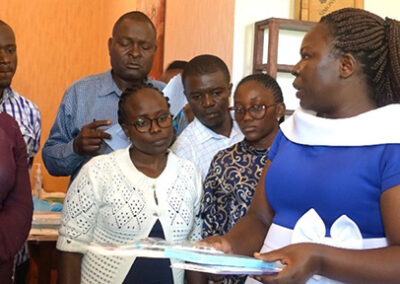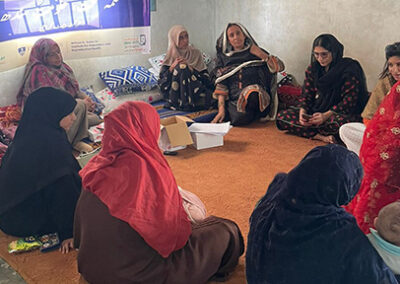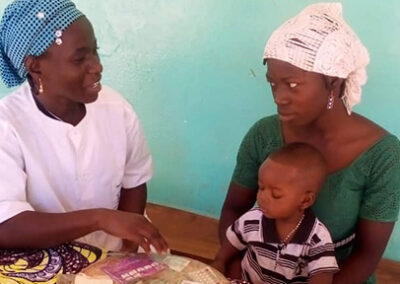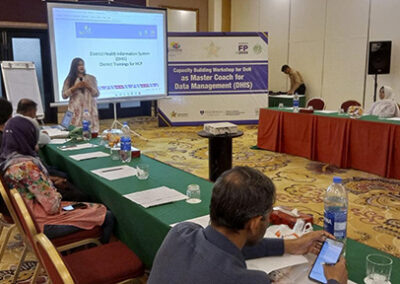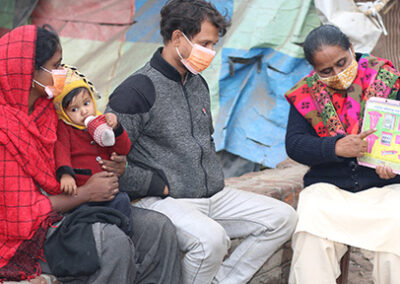 Postpartum family planning (PPFP) and post-abortion family planning (PAFP) are both part of the global collection of approved Family Planning High-Impact Practices (HIPs). The Challenge Initiative (TCI) has been supporting local governments across its six country and regional hubs to implement PPFP and PAFP, but activities and progress vary, reflecting regional contexts and challenges. PPFP and PAFP implementation efforts intensified in the past year as this HIP became more of a global priority.
Postpartum family planning (PPFP) and post-abortion family planning (PAFP) are both part of the global collection of approved Family Planning High-Impact Practices (HIPs). The Challenge Initiative (TCI) has been supporting local governments across its six country and regional hubs to implement PPFP and PAFP, but activities and progress vary, reflecting regional contexts and challenges. PPFP and PAFP implementation efforts intensified in the past year as this HIP became more of a global priority.
In the latter half of 2023, TCI began rolling out refined monitoring tools to track HIPs and other interventions in terms of horizontal scale, vertical scale, and the quality of implementation. While the completeness and quality of this reporting is expected to substantially improve in the coming months, TCI is seeing strong indicators of success related to PPFP implementation.
Figure 1 below highlights the percentage of TCI-supported local governments that met or exceeded TCI’s target of 75% for each indicator in 2023.

Figure 1: Percent of TCI-supported local governments reaching targets for each indicator.
TCI’s indicators of horizontal scale include both health facility coverage and providers trained. As Figure 1 shows, TCI-supported local governments implemented PPFP in an average of 79% of eligible facilities, while reaching 80% of targeted service providers with PPFP training from TCI coaches.
The same is true for vertical scale indicators, with 93% of local governments reporting that they have PPFP embedded in their family planning policies while 90% of targeted local governments have included PPFP in their budgeted workplans. Seventy-seven percent of local governments have spent their intended budget on PPFP. Meanwhile, the indicator for quality of implementation is lagging and TCI has made plans to improve its coaching and support to local governments regarding the quality of PPFP implementation.
The following summarizes TCI’s activities related to PPFP and PAFP by hub in 2023:
- Nigeria: In Nigeria, TCI’s focus has been on enhancing documentation, training, and advocacy efforts to bolster PPFP services. Despite persistent challenges like commodity stock-outs and training gaps, intentional PPFP services have increased.
- East Africa: In East Africa, TCI’s efforts have centered on advocacy, capacity building, and community awareness campaigns. While these initiatives have led to a notable increase in PPFP uptake, challenges such as provider skills gaps and commodity insecurity persist.
- Francophone West Africa (FWA): The FWA hub achieved comprehensive coverage of immediate PPFP across supported cities, emphasizing advocacy and training. Moreover, efforts to integrate late PPFP into the approach have solidified PPFP as a key component of reproductive health policies in the region.
- India: India has seen significant progress in scaling up PPFP through strategic coaching and engagement with health officials. This has resulted in active implementation across eligible facilities, marking a significant step forward in addressing reproductive health needs.
- Pakistan: Despite challenges such as data collection issues and commodity stockouts, Pakistan’s efforts in PPFP implementation show promising trends in client increase. Through concerted efforts, the country is making strides towards improving access to family planning services.
- Philippines: In the Philippines, TCI’s focuses on provider training, system improvements, and policy institutionalization to overcome challenges like stock-outs and procurement delays. However, aligning demand generation with supply remains a concern that requires ongoing attention.
Overall, while substantial progress has been made in scaling up PPFP and PAFP services across TCI hubs, persistent challenges such as commodity stock-outs, data collection issues, and training gaps underscore the need for continued efforts and innovative solutions in advancing women’s reproductive health rights.

